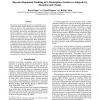Free Online Productivity Tools
i2Speak
i2Symbol
i2OCR
iTex2Img
iWeb2Print
iWeb2Shot
i2Type
iPdf2Split
iPdf2Merge
i2Bopomofo
i2Arabic
i2Style
i2Image
i2PDF
iLatex2Rtf
Sci2ools
AAAI
2006
2006
Bayesian Reputation Modeling in E-Marketplaces Sensitive to Subjectivity, Deception and Change
We present a model for buying agents in e-marketplaces to interpret evaluations of sellers provided by other buying agents, known as advisors. The interpretation of seller evaluations is complicated by the inherent subjectivity of each advisor, the possibility that advisors may deliberately provide misleading evaluations to deceive competitors and the dynamic nature of seller and advisor behaviours that may naturally change seller evaluations over time. Using a Bayesian approach, we demonstrate how to cope with subjectivity, deception and change in a principled way. More specifically, by modeling seller properties and advisor evaluation functions as dynamic random variables, buyers can progressively learn a probabilistic model that naturally and "correctly" calibrates the interpretation of seller evaluations without having to resort to heuristics to explicitely detect and filter/discount unreliable seller evaluations. Our model, called BLADE, is shown empirically to achieve ...
| Added | 30 Oct 2010 |
| Updated | 30 Oct 2010 |
| Type | Conference |
| Year | 2006 |
| Where | AAAI |
| Authors | Kevin Regan, Pascal Poupart, Robin Cohen |
Comments (0)

